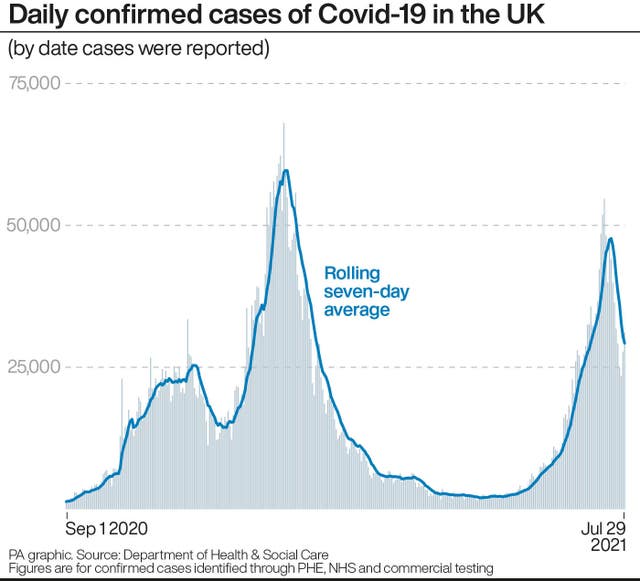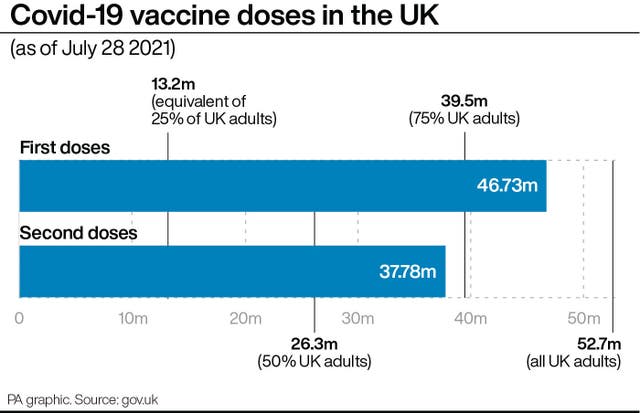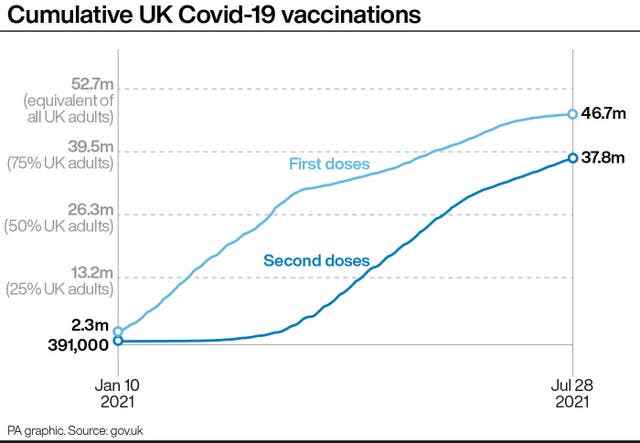‘Bumpy periods’ predicted but vaccine hailed for impact on infections and deaths
Figures from Public Health England also suggest jabs are estimated to have directly averted more than 52,600 hospital admissions.

Covid vaccines are estimated to have prevented an estimated 22 million infections and 60,000 deaths in England.
Figures from Public Health England (PHE) also suggest jabs are estimated to have directly averted more than 52,600 hospital admissions.
The figures were published as England’s deputy chief medical officer, Professor Jonathan Van-Tam, said he hopes the worst of the pandemic is behind us but warned there could be “one or two bumpy periods” ahead.
The statistics cover the period up to July 23 and are based on modelling by PHE and Cambridge University.
Previous estimates, for the period up to July 9, had suggested about 37,000 deaths and 11 million infections had been prevented.
The data emerged as the number of people being told to self-isolate reached another record, with almost 700,000 alerts sent to Covid app users in England and Wales.
The so-called “pingdemic” saw 689,313 alerts sent to users of the NHS Covid-19 app last week telling them they had been in close contact with someone who had tested positive for coronavirus.
The figures, for the week to July 21, are an 11% rise on the previous record of 619,733 alerts a week earlier.
Elsewhere, the Government confirmed there had been a further 31,117 lab-confirmed Covid-19 cases in the UK, as of 9am on Thursday.
A further 85 people had died within 28 days of testing positive for Covid-19 as of Thursday, bringing the UK total to 129,515.

Separate figures published by the Office for National Statistics (ONS) show there have been 154,000 deaths registered in the UK where Covid-19 was mentioned on the death certificate.
The blitz of new statistics and estimates come amid uncertainty over how the pandemic will unfold in the coming weeks.
Prof Van-Tam disputed a claim made by a senior minister earlier this week that Covid was “all over bar the shouting” after cases dropped sharply this month.
The medical officer told BBC News: “I wish it were so. This is not all over bar the shouting.
“I hope the worst is behind us but I think it’s quite possible that we’re going to have one or two bumpy periods in the autumn and in the winter, not only through Covid, but also through flu and other respiratory viruses as well.”

He said lockdowns last winter had “completely shut out pretty much all of the other respiratory viruses” which could re-emerge this year.
This week the Government said it was expanding daily contact testing for frontline sector workers who are exempt from isolation.
Downing Street has confirmed 260 testing sites are open, while 800 more are “in the process” of being set up for support workers in critical industries.
A spokesman for the Prime Minister said: “Following them, we will then establish the remaining 1,200 over the coming days.”
Daily negative test results will enable eligible workers, including those in prisons, waste collection, defence, the food industry, transport, Border Force and police and fire services, who have been alerted by the NHS Covid-19 app or called by NHS Test and Trace as coronavirus contacts to continue working.
Communities Secretary Robert Jenrick urged people to isolate if they are advised to do so, saying there “isn’t very long to go” until August 16 when all fully vaccinated contacts who test negative can avoid isolation.

But one in four young adults who test positive no longer follow the rules for self-isolating, a survey published on Thursday suggested.
The ONS found that 75% of respondents aged between 18 and 34 said they fully adhered to isolation requirements for the entire 10-day period after testing positive for coronavirus.
This was “statistically significantly” lower than the percentage of 35 to 54-year-olds who said they followed the rules (86%), according to the ONS, whose figures are based on responses collected from adults in England between July 5 and 10.
While there is a legal duty in England for people to self-isolate if they test positive or are contacted by NHS Test and Trace, this does not extend to notifications from the app, although the Government strongly advises people to do so.
The latest Test and Trace figures showed the proportion of people not being reached by the scheme to provide details of recent close contacts has hit the highest level for nine months, at 14.8%.

The number of people testing positive in England in the week to July 21 reached 307,758, up 18% on the previous week and the highest number since January 13, according to the figures.
Meanwhile the easing of restrictions for EU and US travellers coming to England has been defended as a “smart, sensible” approach by the Government, amid concerns about the risk of a new variant emerging.
Foreign Secretary Dominic Raab said he is confident it is the right step and described the new rules as a “modest opening up”.
From 4am on Monday, England is to allow people visiting from the US and the EU who are fully vaccinated against coronavirus to enter without the need to quarantine.
Labour has claimed there is a risk of allowing a new Covid variant to “run rampant” through the country, and it has been reported the Cabinet had been warned the move posed a “clear public health risk”.





